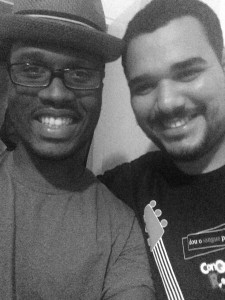May 13, 2015- Salvador, Bahia, Brazil
Boa noite, readers! Meu nom Roman! At the time of this post, it is late at night and I am retiring from today’s adventures full of new sites and experiences. I am so happy. Today has been a truly transforming experience visiting Pelourinho because so much of Africa’s history is literally in the landscape. (The picture that you see below is one of myself in Pelourinho.)
It is a historical fact that Africans built the golden Catholic churches which line the streets of Salvador. Jorge Amado, one of Salvador’s most famous members and a prominent writer, once wrote of Salvador’s breathtaking beauty. But Salvador’s beauty is not something one can capture in a book: it is truly transcendent of time and space. The city’s people are multiracial and mostly the descendants of those who performed slave labor here harvesting tobacco, sugarcane, and cotton. Most of the crops were introduced here by the Europeans were harvested as commercial goods. Although Brazil is multiracial, Salvador has a distinctly black, or African, essence.
Blackness is found in the way the men strut with a handsome gait and in how Afro-Brazilian women model their afros with such beautiful grace and style. The people are gorgeous!
Brazil–the city of Salvador in particular– is black in the respect that is connected to traditional African spiritual practices. Candomble is closely connected to the Ifa Vodun tradition of Nigeria, Benin, and Togo. This religion’s deities came from the religion Ifa and include Ochala (Obatala), Oxum (Oxum), Chango (Shango), and Oxosi (Ochosi). Today, I was re-introduced to this information by our tour guide for the Pelhourinho visit, Fred. Spirituality is a celebrated thing here!
I am happy to have so many adopted family members now. My brother Nito returned home today. One of my brothers, Igor, (who is actually a leasee of my host mother), is also pictured below on the right with myself.
I’m having a blast every day!
Tchau tchau,
Roman



Roman, what great pictures and an exciting blog about Salvador and the richness of its history, people and religions. Isn’t exciting to have a new family in this place, the homestay sounds like it has been great. I am interested in knowing how your blog title is related to your experiences so far. How is your life changing? I know from my own experience in Brazil, being in a new country with loving people, made me feel comfortable enough to enjoy and relish in the newness of a different culture. How is your life changing?
Love the flavor of this post! Sounds like an advertisement from the travel bureau!
Oi, Profesora Ramsey-White!
My life is changing because this is the first time I’ve encountered black Brazilians who are not only proud of their heritage, but teaching African history and organizing around health and poverty related issues, too. My perspective has broaden about what being an African descended person means in general now that I’ve been introduced to Afro-Brazilian people and their culture.
Also, blackness is something that people in Salvador have grappled with deeply. Some people don’t identify as black. Others wear their blackness proudly. But there are different conceptions about what being black means here. The word “Negro” is used here to signify a black person, however, in the United States this is an antiquated word. Learning about Steve Biko and his cultural and political activism at the Instituto Cultural Steve Biko influenced my blog post title. Steve Biko was an intellectual and activist who is known popularly as one of the founder of the Black Consciousness Movement that originated out of South Africa. (There happens to be a Steve Biko Institute in South Africa as well.) The Instituto Cultural Steve Biko in Salvador is an non-governmental organization (NGO) dedicated to improving the education of Afro-Brazilians in Salvador. The director of this institute reported that education for the vast majority of black youth in Salvador is very poor.
I love it Roman. Thanks for responding